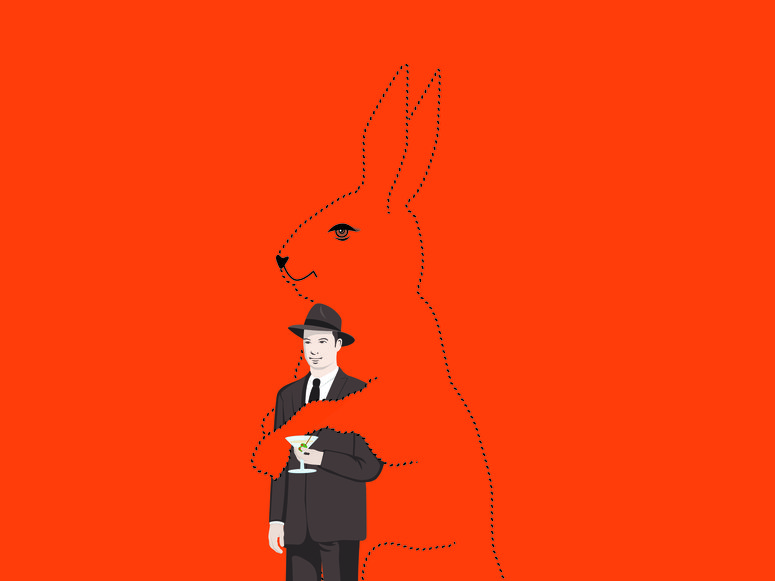Playwright and director KJ Sanchez has spent large portions of her theater career working on plays and docudramas about PTSD – most famously "ReEntry." Her latest directorial effort, however, finds her working with a very different kind of mental dilemma, namely a six foot tall rabbit of a mental dilemma named Harvey.
When most people think of "Harvey," their minds probably jump to the classic 1950 Oscar-winning Jimmy Stewart film. But before Stewart got a crack at it, the story of Elwood P. Dowd and his pooka started out on stage. Now, it's returning to its origins with a run at the Milwaukee Rep starting Tuesday, Nov. 18 in the Quadracci Powerhouse.
Before the lights go up, OnMilwaukee.com got a chance to chat with Sanchez about what drew her to "Harvey" and turning an invisible rabbit into an actual character.
OnMilwaukee.com: It’s interesting that you wrote these plays about PTSD and now you’re doing "Harvey" about a man and others dealing with mental troubles.
KJS: I know, I am very interested in war plays and post-traumatic stress. I guess what I’m really most interested in is not necessarily the terrible things that happen in the world, but how do you move forward from those terrible events. And I find that’s where the beautiful things in human nature are. If you spend too much time on the dark side, you can start to lose hope. One of the things that I was particularly drawn to with "Harvey" is the humanity when you move on.
And Elwood P. Dowd is such a beautiful example of how to live your life when you’ve had something terrible happen. What’s so great about the play is that the terrible thing is never mentioned. I think right now we’re very tempted to always put the bad things on stage, and what was so smart about Mary Chase is that she didn’t mention any of it. I think that was implied also because she wrote it in 1943 when the nation was still at war. She didn’t have to talk about a veteran; the country was already dealing with it. What she wanted to do was to provide some peace, a laugh and a smile.
But it’s clear the Elwood P. Dowd, like you said, has come from something traumatic that is never talked about. But what he does throughout the play is an active choice to be pleasant and to find beautiful and comfort in any human interaction.
OMC: Did you watch the movie before taking on this show?
KJS: It’s always been one of my all-time favorite movies. I’ve loved it forever. I’ve seen it several times, and every time I watch it, I bawl like a baby at the end. So when Mark called and asked if I would be interested in doing "Harvey," I was just immediately beyond thrilled. It was always on my list of plays I wanted to do.
But since getting the job, I haven’t looked back at the film because I felt that Jon (Daly, playing Elwood in the Rep's production) should own his own performance of that. It’s interesting because Jimmy Stewart didn’t originate the role; somebody else performed it on Broadway. So it was easy for us to honor what he offered and gave to the cultural history of the play, while at the same time saying that it was in no means replicating the movie or what he did.
OMC: Were there things you wanted to make sure that you changed from the movie or kept from the movie?
KJS: The reason the movie was an important part – I didn’t want to go against the movie – was because Mary Chase wrote the screenplay for the movie. I’m assuming she was on set, and it was likely that she had input into the movie. So really, what I’d be looking for in the movie would be Mary Chase’s tastes in terms of who Elwood is and what the story is. I looked at it as a kind of treasure map to find where the playwright was in the movie.
OMC: What tastes did you find?
KJS: The places that worked the best were when the comedy wasn’t forced. That’s why I think Jimmy Stewart is the person we hang onto in that story; he wasn’t pushing anything.
Also, with the text, she was writing for actors in a particular time that took elocution lessons, that spoke in a very particular way. Contemporary actors, we tend to act between the lines a lot, and one of the things that can be learned from the movie that we maintain in this production is there’s a crispness and musicality to the text that we really needed to honor. If you slow it down to think and feel between the lines, the whole thing kind of falls apart. It’s a soufflé, so you have to keep everything light and airy and moving forward.
OMC: How do you go about creating an invisible character on stage?
KJS: Our entire focus in rehearsal was working on the play as if it was a brand new play. The whole play is about revelation of character, and it’s not just about Elwood. He’s really not that crazy. Everything he does is actually really practical.
When we rehearse the scenes where Elwood is talking with Harvey, we actually have an actor stand in as Harvey. We staged all of the scenes with Harvey. We’ll have scenes where we’ll say, "Jon, if Harvey’s sitting in this seat, you wouldn’t be able to see the doctor standing there. You’d have to look around Harvey." There are all of these moments where he’s having a conversation with somebody, but he locks eyes with Harvey and has a non-verbal conversation with him as you do with friends. So none of his behavior is really all that crazy.
OMC: So you blocked out the whole play with somebody playing an invisible rabbit?
KJS: (laughs) It was great. Chris (O'Reilly), who plays E.J. Lofgren in the show, he’s the exact height and size of Harvey. So every time Elwood walks in and says, "Oh, have a seat, Harvey," there Chris walked in and sat down. And it was hard for the other actors because they had to ignore this actor on stage. There were several times in rehearsal when one of the actors would say, "We should probably look at this because I’m blocking Harvey right now; the audience can’t see him," and I’d say, "That’s not going to be a problem." (laughs)
OMC: When in the process did you remove Harvey from the stage?
KJS: We go back and forth to it, just to refresh Jon’s sense memory. We’ll stage a scene with Chris, and we’ll do it a couple of times. Then he’ll step away, and Jon will do the scene with Chris’ ghost in the room. If we look at a piece that’s starting to get a little muddied, we’ll bring Chris back in.
There are several times where Elwood laughs or nods or responds with "So do I," so we had to figure out what exactly Harvey was saying to him.
OMC: So you’re writing a whole additional part …
KJS: Just to take it away, yeah. (laughs)
OMC: I have to ask: Do you believe in Harvey? Is Harvey real?
KJS: The audience will decide for themselves, but I do. The interesting thing is Harvey isn’t real for everybody. Harvey is only seen by people who are ready to see him, and a couple of times in the play, the people who are ready to see him a little bit drunk. You almost have to have a bit of an altered personal state to see Harvey. So maybe if our audience has a couple of cocktails before the show or at intermission … (laughs)
As much as it is a gigantic cliché to say that one has always had a passion for film, Matt Mueller has always had a passion for film. Whether it was bringing in the latest movie reviews for his first grade show-and-tell or writing film reviews for the St. Norbert College Times as a high school student, Matt is way too obsessed with movies for his own good.
When he's not writing about the latest blockbuster or talking much too glowingly about "Piranha 3D," Matt can probably be found watching literally any sport (minus cricket) or working at - get this - a local movie theater. Or watching a movie. Yeah, he's probably watching a movie.







